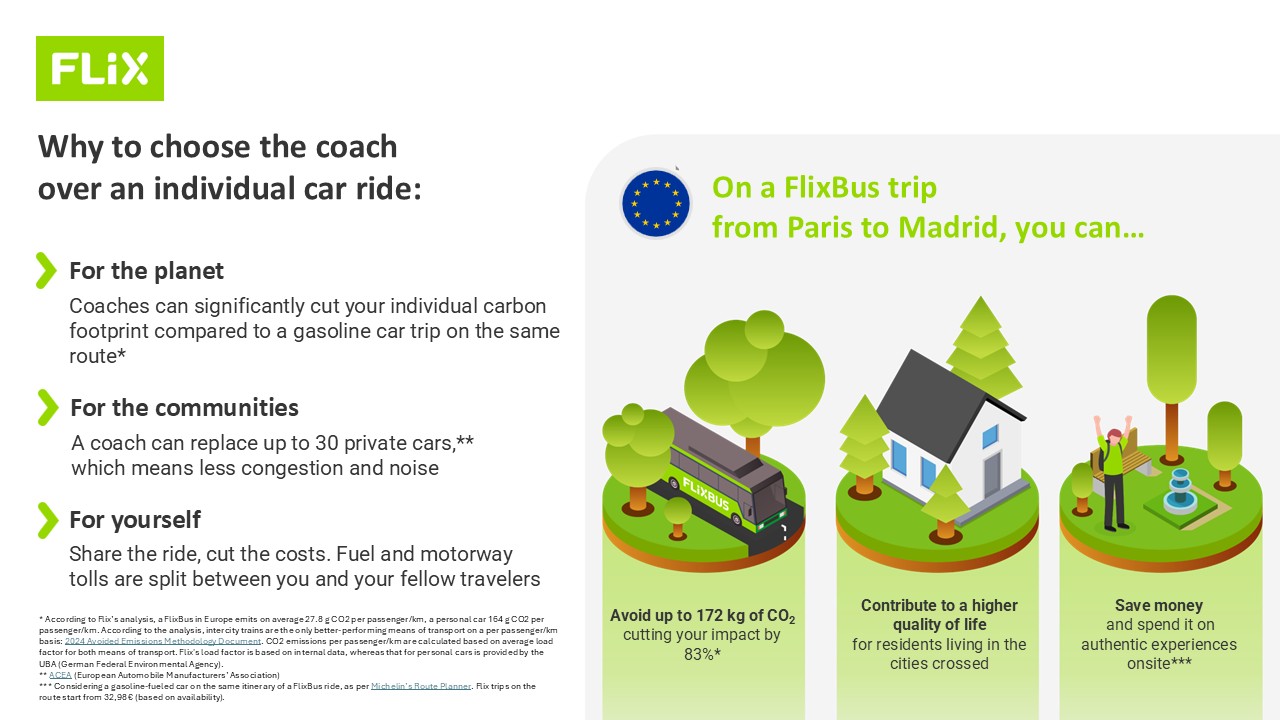23. September 2025
World Car Free Day: in Europe, traveling by coach rather than by personal car can save up to 83% CO2
+++On World Car Free Day, Flix highlights how simple choices in everyday travel can make a measurable impact
+++ In Europe, passengers switching from car to coach can reduce their individual carbon footprint by up to 83%
+++André Schwämmlein, CEO of Flix: “Sustainability must not be a privilege for the few. For over a decade, we have been proving that affordability and responsibility can go hand in hand.”

Munich, September 22nd, 2025 – On World Car Free Day, Flix highlights how simple choices in everyday travel can make a measurable impact.
In Europe, passengers switching from car to coach can reduce their individual carbon footprint by up to 83%. A trip from Paris to Madrid illustrates the effect. By car, one traveler emits around 207 kg CO₂ (164 g/km). By coach, emissions fall to just 36 kg CO₂ (27.8 g/km) – more than five times less. [1]
In 2024 alone, Flix customers worldwide saved an estimated 1.5 million tonnes of CO₂ just by choosing its mobility services over other modes of transport that emit a higher amount of CO2 on a per passenger/km basis, like cars and planes. This proves that affordable collective travel already makes a difference.
Besides, each coach can replace on average 30 private cars on the road. [2] This not only reduces emissions, but it also relieves traffic and noise – a direct benefit for local communities.
«Sustainability must not be a privilege for the few. For over a decade, we have been proving that affordability and responsibility can go hand in hand. With technology, we will continue to enhance convenient travel worldwide to make better choices available for as many people as possible,» says André Schwämmlein, CEO and Co-Founder of Flix.
The comparatively low emission factor per passenger/km of the FlixBus service, which in Europe is overperformed only by intercity trains, is made possible by a modern fleet predominantly equipped with Euro 6 coaches. In addition, while zero-emission solutions for coaches are still hard to scale up, over the years Flix has been engaging with diverse partners to pilot alternative drives and fuels to reduce its impact. A full overview of the projects activated is available here.
While technological advancement is paramount to making travel by coach more sustainable, better infrastructure is key to encouraging collective travel today. In 2024, close to one third of interviewed Flix passengers rated public facilities at coach stops as poor in quality or safety. [3]Ensuring adequate terminals and stops is essential to fully unlock the benefits of collective travel.
[1] For a comparison of emission factors for different modes of transport, see Flix’s Avoided Emission Methodology Document 2024, pp. 8-9.
[2] ACEA (European Automobile Manufacturers’ Association), Buses: what they are and why they are so important
[3] Flix data, Post-Ride Survey – Stop Ratings, January 2024-September 2024. Total sample size is 803,000 passengers. 15% of Flix travelers rated facilities as their departure stop as “poor” throughout the data collection period, 13% as “very poor”.
About Flix
Flix intends to transform the collective transport sector by offering sustainable and affordable long-distance bus- and train travel solutions in more than 40 countries across five continents through its brands FlixBus, FlixTrain, Kamil Koç, and Greyhound. With its asset-light business model and innovative technology platform, Flix, launched in 2013, swiftly established a market-leading position for long-distance bus travel in Europe, North America and Türkiye and is expanding further into South America and Asia-Pacific region.
Driven by increased awareness for sustainable travel, Flix publicly committed to the Science Based Targets initiative (SBTi) as a framework for scientific decarbonization. In April 2024, the SBTi validated Flix’s near-term targets for emissions reduction, thus acknowledging that its strategy is in line with global climate goals.
While Flix manages the commercial side of the business such as network planning, pricing, operations control, marketing and sales, quality management and continuous product development with a data-driven approach, trusted Flix partners conduct the daily operations. The innovative combination of Flix’s technology and sales platform with traditional passenger travel has turned a European start-up into a leading and globally expanding travel tech company.
In Germany, FlixTrain has been driving competition in long-distance rail transport since 2018 and has quickly established itself as a popular travel alternative. Like FlixBus, the technology platform is at the heart of FlixTrain’s business model. Today, FlixTrain directly connects around 50 cities, with an additional 600 that are bookable through cooperation with regional train services. FlixTrain operates the first and largest private long-distance train network in Germany, giving even more people access to sustainable and affordable mobility.
For more information, please visit corporate.flix.com